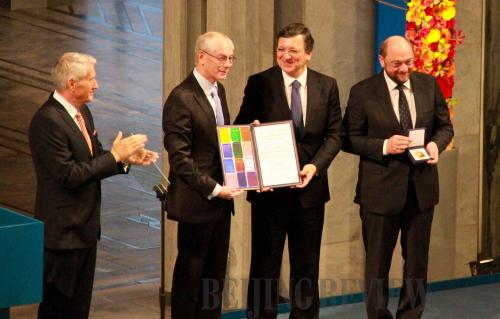|
 |
|
HONORED UNION: President of the European Commission Jose Manuel Barroso (second right), President of the European Council Herman Van Rompuy (second left) and President of the European Parliament Martin Schulz (first right) receive the Nobel Prize for Peace on behalf of the EU in Oslo, Norway, on December 10, 2012 (LIU MIN) |

The EU begins 2013 with two contradictory facts from the last 12 months. The first is that despite all the gloomy predictions, the euro zone so far has not fallen apart. The crisis, which has been ongoing for three years, has become a kind of normality. Emergency summits are held almost monthly, presenting new initiatives on how to deal with threats such as the collapse of the Greek economy, the problems of unemployment and debt in Spain, or political uncertainty in Italy. All that can be said for these multiple summits over the last 36 months is that they have thus far avoided the worst possible outcome—a breakup of the euro, a collapse of the EU, and the end of one of the greatest multilateral achievements of the modern world.
But against this can be held the second fact. In 2012, as in the three previous years since 2009, growth in most of the EU was flat. Estimated figures released by Eurostat, the statistics agency for the 27 EU member states, predicted a minus 0.3 percent GDP rate in the whole EU for 2012. Within the 27 member states, 11 were forecast to have negative GDP growth, with Greece coming as the worst, with a 6-percent contraction. Other negative growers included Italy, the Netherlands, the UK and Spain. Even the mighty Germany recorded a miniscule 0.4-percent growth rate, Latvia and Poland recorded the strongest growth, with over 4 percent between them. It didn't matter whether countries were in or out of the euro zone. For both, there was an average negative GDP growth rate of 0.3 percent. 2012 could therefore be called a year of stagnation.
While the EU has managed to avoid catastrophe over the last year, real challenges continue to stand in the way of finding growth. The bottom line is that there is no workable political consensus regarding how to kick-start the world's largest single economic bloc, even though the crisis first appeared over three years ago.
One issue has become a little clearer in the last 12 months. The fierce arguments about the budget of the EU itself in late 2012 showed how wide the differences were between member states over what the union should do and, most importantly, how it should be funded. The election of French President Francois Hollande in mid-2012 opened up a significant gap between France and Germany. Hollande's controversial support for more public spending and increased taxation on the wealthy flew in the face of policies in Germany, which supports deeper cuts in public debt and the need to grow through exports.
The thorniest issue of all was the position of the UK. Having vetoed a change to the EU treaty in December 2011 to tackle the euro crisis by giving the EU greater fiscal powers, British Prime Minister David Cameron has had to face down constant criticism within his own Conservative Party for being "too soft" on Europe. The demands of the EU for a rise in its central budget therefore could not have come at a worse time. Surprisingly, however, it was not the UK that caused the December 2012 budget talks to collapse, but a division between northern European powers that want tightened control of the money the EU spends on subsidies and regional development, and southern and eastern member states that insist on keeping spending levels where they are.
Some politicians in the UK are blatant about their desire to depart from the EU. Meanwhile, there are undercurrents throughout the rest of Europe that although a breakdown of the union would be a disaster, it cannot continue as it is. The crisis has changed the face of Europe, making Germany much stronger, seeing more growth shift to countries like Poland, and causing the fortunes of Italy and Spain to dip. Faith in the ability of politicians to cure these problems has all but vanished, with cynicism largely thriving where there was once idealism.
|
